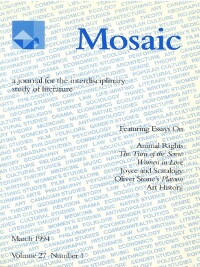Issue 27.1
Overview

General Issue
Published: January 1994
See the issue summary and contents below.
6 essays, totalling 152 pages
$15.00 CAD
This general issue of Mosaic includes essays that examine cruelty toward animals, cruelty toward the working class in Platoon, excrement in James Joyce, death and structuralism in D.H. Lawrence, cognitive linguistics and Henry James, and the history of art.
"The Meanest Thing that Feels": Anthropomorphizing Animals in RomanticismOnno Dag Oerlemans The representation of animals in Romantic art and literature is examined in the context of the emerging debate in the late eighteenth century about the status of animals and the consequent rise of the anti-cruelty movement. This essay argues that romantic painters and poets provide a critique of anthropocentrism that anticipates the sea-change in humankind’s understanding of their relationship to nature brought about by Darwin. | |
Metaphors, Cognition and Behavior: The Reality of Sexual Puns in The Turn of the Screw.Sämi ludwig Tracing the interdependence of language and reality, this essay applies the theories of cognitive scientists to Henry James’s The Turn of the Screw. Close reading, which insists on referentiality, turns the many sexual allusions in James’s prose from connotations into denotations and uncovers a pornographic narrative of enforced sexual initiation. | |
Death and the Rhetoric of Representation in D. H. Lawrence's Women in Love.Gerald Doherty This essay applies Roman Jakobson’s binary system of rhetoric to the representation of death in Women in Love. While Lawrence’s novel harks back to traditional configurations of death as metaphoric event, geared to transformations, it also anticipates contemporary conceptions of death as metonymic event, stripped of meaning and devoid of transcendental resonance. | |
Powers of Ordure: James Joyce and the Excremental Vision(s).Kelly Anspaugh This essay challenges Ashraf H. A. Rushdy’s “New Emeticism” in much the way that Julia Kristeva challenges Mikhail Bakhtin’s optimistic excremental vision. It argues that, although seen by most of his critics as an emeticist author, Joyce recognizes that the value of excrement, tropologically speaking, lies precisely in its irredeemably abject nature. | |
Oliver Stone's Platoon and the Politics of Romance.Milton J. Bates Oliver Stone’s Platoon, far from being the ideologically neutral film some critics take it to be, is a strong indictment of the American middle class for sending mostly working-class soldiers to fight the war in Vietnam. By invoking the conventions of the literary romance, however, Stone complicates and ultimately undercuts his own message. | |
The History of Art and the Art of History: Hugh Hood's Five New Facts About Giorgione.Alex Knoenagel Hugh Hood’s novella raises questions about art history that correspond to the current debate about the nature of historiography. This essay focuses especially on the ethics of revisioning history and the way that Hood plays upon the reader’s lack of specialized knowledge about Venetian Renaissance painting. |